M&Ms: Prioritize Learning
Why learnings can steer you in the right direction in the 89th edition.
Hey Team,
I tell all the juniors I advise, in tech, to prioritize learning early on.
That's because the money will usually come in our field, especially if you get really good. But this turns out to be good advice, even for career pivots. I know because I've prioritized learning in my pivot to entrepreneurship in the last year and am pretty happy with the results.
Juniors in tech seem to believe me. But people thinking of career pivots don't seem to believe this at first.
It might be because most people who want to try entrepreneurship have been taught something entirely different over the last few decades. We've all been taught that eating ramen to achieve grand ambitions is the only way. This is what I believed when I quit my big corporate job in September 2021.
After all, who in tech doesn't dream of starting the next big tech company and making the big bucks? Who doesn't want to pitch VCs on an idea and be handed a bunch of money to work on their dream?
VCs might give you money, but money can’t make the idea a success. And the people distributing venture dollars aren't stupid. They'll never hand you enough money to live well, just enough to eat ramen. That's why you should take matters into your own hands and get the lessons you need to succeed.
But every YouTube video on entrepreneurship, every article I read, and every common trope says we should eat ramen for years in the name of our ambition and focus on one thing; then, we might hit it big someday.
But what if you don't make it after all that? Over 90% don't; this is a real statistic on startup failure. What if you have a family and kids to feed? If you don’t make it you’ll have no money and you’ll have no learnings.
Some people have an answer for that too. They might say, "don't become an entrepreneur then; just stay an employee."
But that's bullshit. People used to start good businesses with low risk all the time. Maybe they didn't scale at first, but at least they ate better than ramen and got some guaranteed lessons too. There is a better way, a safer way even today, and even with internet and tech businesses. Entrepreneurship is and has always been about taking smart risk. In that sense, any entrepreneurial endeavor is more about mitigating risk than taking on an ungodly amount of it.
So what is this better way? Well, unfortunately, it might require you to forget the common advice. You might have to drop your ambitions, at least for a little while, and it will require you to prioritize learning over big money. Like those juniors, I advise.
Unfortunately, many people aren't interested in the learnings a few dollars can provide. They want the millions. But making a few dollars on the internet today is relatively easy.
Take my friend Janahan who made his first few dollars on the internet today by putting together what he already knows well—writing as an engineer and getting promoted as an individual contributor to very senior levels. He took a leap of faith, placed a small bet, and made his first few dollars on the internet today.
But Janahan is smart; he knows firsthand that today's common wisdom on entrepreneurship is crap. That's why he isn't too good to try and place a small bet. He tried to do a startup before while eating ramen and all that. And it failed. So now he is prioritizing learning, establishing credibility, and opening up new opportunities for himself.
Like those juniors starting out in our field, chances are you, too, will need the lessons if you'd like to pivot to entrepreneurship someday.
But people want shortcuts; they want to skip straight past the lessons the pennies and the dollars have to give and have ambitions to move right onto the millions.
But if you can't even make a few dollars on your own, how will you make millions?
If you can't even help one person, how will you help many? It's all common sense, yet none of it seems to be common wisdom right now.
Luckily, some corners of the internet live these ideals right now. The Small Bets community that I am a part of is one. Last year at this time, I decided to allocate a week to place my first small bet. But as a "startup founder," it felt like a waste of time. But thanks to the community, I got over my regular programming, and I took the leap of faith anyway.
Then lo and behold, I made my first few dollars on the internet.
But I got much more than that.
I immediately got opportunities.
People were suddenly taking me seriously on Twitter. After all, if someone gives you money for something you made, there is no way you can be an idiot on that topic. If you are an idiot and take their money, people will rip you apart. They'll demand their money back.
Your first few dollars lead to people paying attention, and all of this leads to credibility. It teaches you sales, marketing, creating, and so much more.
When people pay you for something with their hard-earned dollars, they are far more likely to consume it. Aren't you more likely to go through a course you paid for vs. some free one? Or use an app you paid for vs. some random free one? Even a few dollars spent will mean people will at least check it out; after all, they paid for it they want their money's worth.
One of my favorite rappers, Biggie Smalls, said something along the lines of, "You ain't nobody until somebody shoots you."
I say on the internet, and in a capitalist society, you aren't really credible on the thing until someone gives you money for it.
But there is more.
Shortly after my small bet, other opportunities started popping up. I immediately started getting offers to be on Podcasts, newsletters, educational apps, and all sorts of platforms. That's right; they offered me, the awkward and introverted engineer, an opportunity to speak on platforms that large audiences watch and consume. It's a crazy world we live in right now, if you do it right you could build up a lot of skills.
I cringe at my first podcast appearance early last year. But my last one for the year in December 2022 was actually pretty good. This is what happens when you have a chance to practice.
But you might never get the chance to practice if no one believes you are credible. And then all this stuff is connected. My first small bet helped a lot of people.
Over 2k people consumed my products last year.
Some of the people who put what I taught into practice got promotions or were helped in some other way. They are now supporters of my work. When I make a new SaaS, or some other product, they are more likely to help me amplify it, hit like, re-tweet, and share it. And I have seen that people do that even if they aren't the target audience for it, but just because they believe in me now.
The world is far more connected than you realize; this is why you should make things to help people. Because just like me, you, too, might need help someday.
But none of that would've happened if I hadn't placed my first small bet. If I hadn't tried something different. If I hadn't prioritized learning and gone against the common wisdom on entrepreneurship. Small bets is how snowballs can turn into avalanches.
So, you, too, should forget about the common wisdom doled out on entrepreneurship today. Take it from a real entrepreneur early in the game in 2023, me. Not one starting in 1994.
Make something, charge a few dollars, and sell it online, help a few people. Not because you necessarily need the money but because you need the learning. And you need people to take you seriously. And because everything is connected and things build on each other.
Then you should make even more things, and get the lessons from those things too. And if some of them start working out really well, you can double down on things that are working. And who knows where that will all take you.
And all of this does not require you to eat ramen for a long time or even quit your job. Janahan hasn't. You can do this on your nights and weekends if you have to but just do it.
Two Tweets: Buffet’s Secret, A Brutal Statistic
I have been reading and consuming a lot of Warren Buffet and Charlie Munger lately, and I have to say their edge is common sense.
To me, these shocking statistics point out that no one gets a free pass on bad writing.
And there is no worse writing than dry academic papers.
That is why these skills one builds up in this internet game are so valuable. You learn how to write to be read by others.
Three Memes: Mr. Wonderful’s Offer, Money to throw Away, Stupid Risk
Open AI was valued at 29 Billion but the terms were very favorable to Microsoft. It was the type of offer Mr. Wonderful would’ve made.
Some people need to learn this lesson the hard way. No one has money to give away for nothing.
I say no one has money to throw away, but someone gambled $1.4m dollars in order to make $11.2k because they were certain it was a sure thing.
Then, the game turned around on them, the other team won, and they lost all $1.4m.
This is the textbook definition of what Warren Buffet says: "Some people risk everything they have and need for what they don't have and don't need."
As always, thank you for reading!
-Louie
P.S. you can reply to this email; it will get to me, and I will read it.



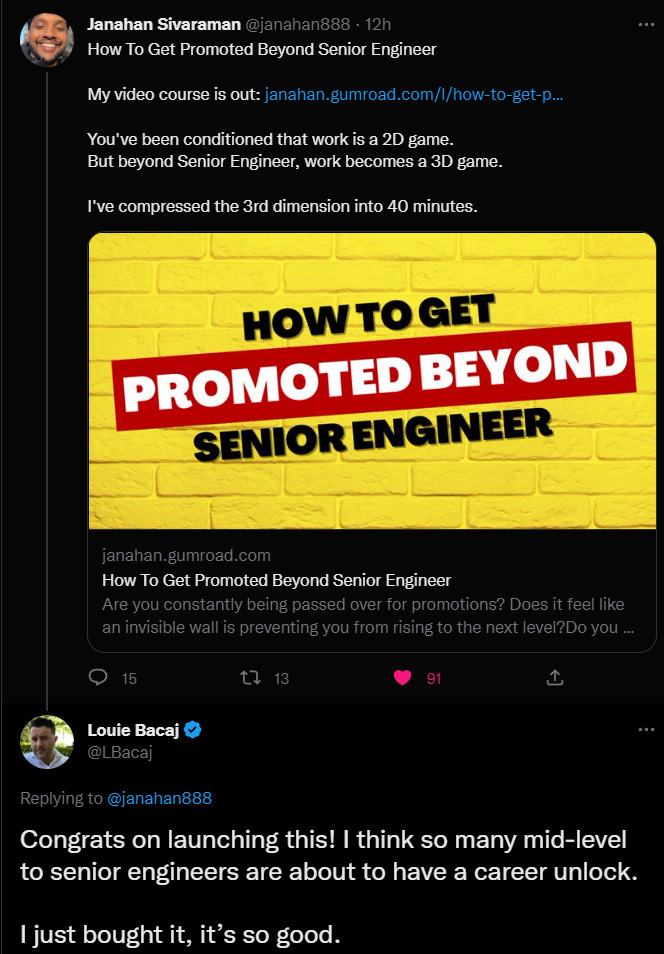

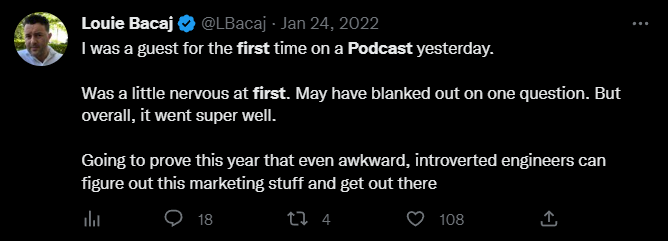
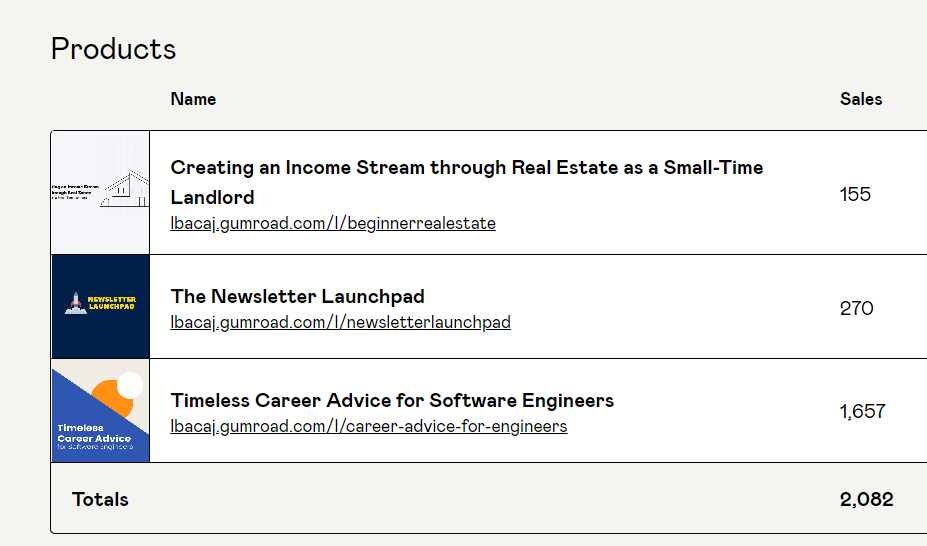

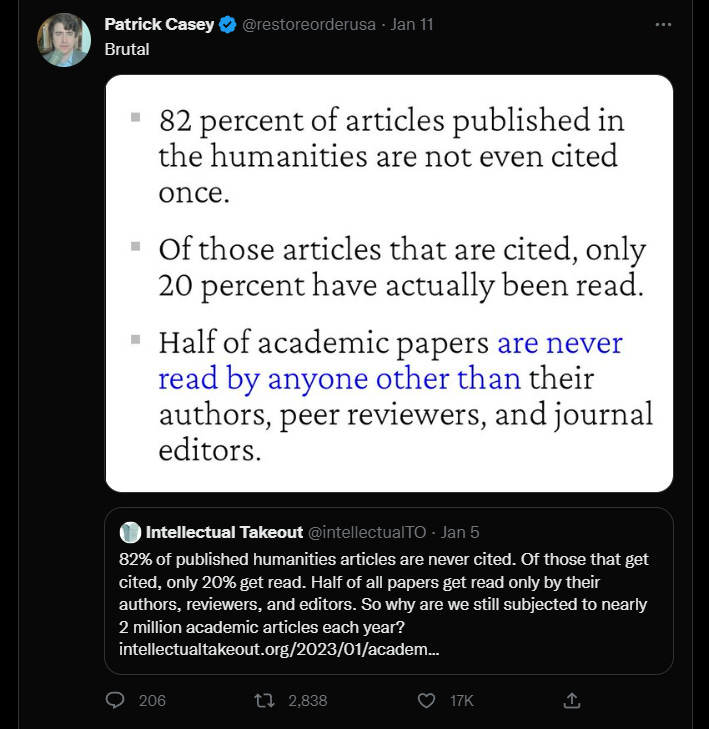
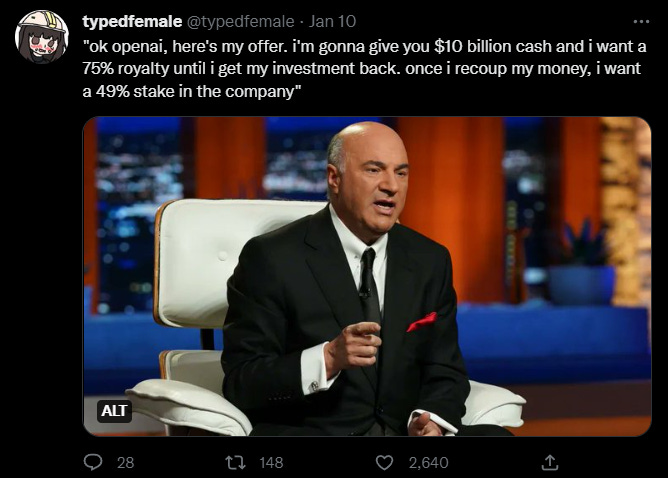
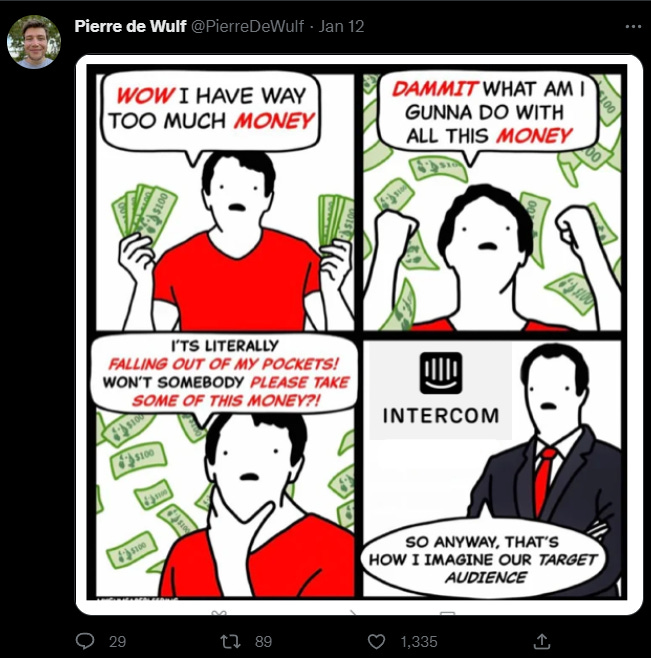
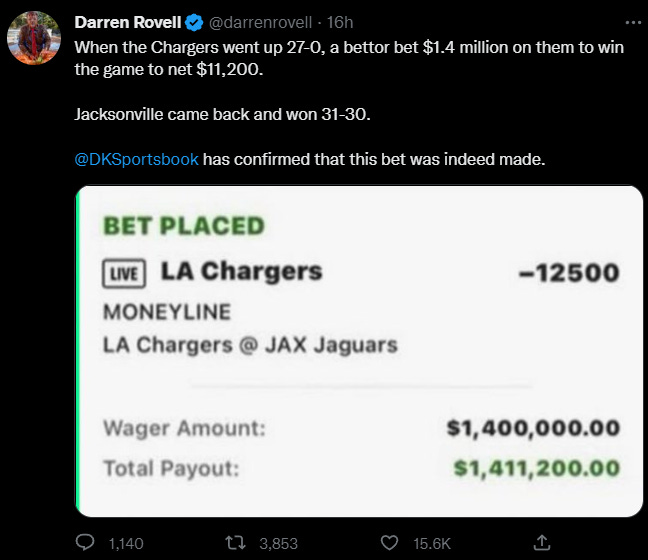
Thank you for opening my eyes to this flavor of entrepreneurship. It makes 1000x more sense than the VC flavor.
In entrepreneurship, “you ain’t nobody til somebody pays you”. But the credibility, learnings, and opportunities are what make you someone.
Small wins snowball. Compounding til infinity.
> today's common wisdom on entrepreneurship is crap
Agree it's crap
I know cause i swallowed it hook line and sinker
It's peddled by people who are incentivised by large pools of people swinging for the fences such as VC people (who needs large pools of people who try and only 1 or 2 to succeed) and media people who need dramatic stories for their news